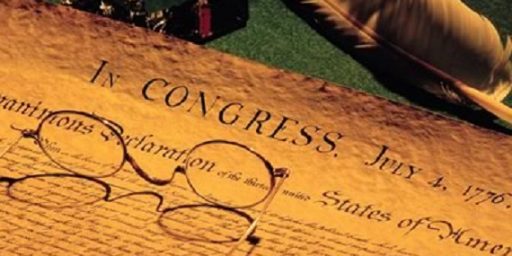But, the Founders!
If we embrace the Founders to justify the present, let's think about what we are doing.

Building off some ideas from my previous post, as well as to address an ongoing rhetorical move within American politics, let’s be clear about how we can discuss the Founders and democratic/republican/constitutional governance.
One option is to take the Founders literally and to adhere to exactly what they wrote, thought, and designed,
A second option is to treat what they wrote, though, and designed as aspirational (or, at least, a system that is evolving).
Specifically in regards to the first option: the government created by the US Constitution as initiated in 1789 was one in which the following was true:
- Many states had property/wealth barriers to vote.
- Women could not vote (and lacked legal equality to men).
- We had chattel slavery.
Those are just three rather obvious ways in which the early republic would not qualify it as a democracy in 2020.
Further:
- The Senate was not popularly elected.
- The Electoral College had no connection to the popular vote.
So, very limited suffrage in the general public and several portions of the federal government disconnected from elections. Further, let’s just state that when Jefferson wrote that “all men are created equal” he meant white males only.
If we are going to really embrace a Founders-specific view of “the republic” without any assumption of evolution then be honest about what is being embraced.
However, there is a cogent argument to be made that we can view what was started in 1789 as being founded on an aspirational/evolutionary set of principles.
After all, over time we have gotten rid of slavery, expanded suffrage, connected the Electoral College to the popular vote, made the Senate elected, expanded civil rights, etc. We are far from perfect, but the general trajectory has been positive (at a bare minimum, it is quite a bit more evolved than what was in place in 1787). From this perspective, it is not unreasonable to expect further democratization of our politics.
My basic point is this: we can either appeal to exactly what the Founders created, which is to defend what is indefensible, or we defend the idealized, aspirational version of what they created.
Of course, I am fine with just looking at world history writ large and find those governmental structures that have done the best in defending human rights and provided for human prosperity and come to the conclusion that actual democracies tend to fit that bill and, therefore, want the country in which I reside to adopt those kinds of structures.






You can delete this message after you take a look at that.
@Teve: Thanks for noting that.
What wing nuts and the strict constructionists fail to recognize is that 12 of the 27 changes to this “perfect” document were done by the Founding generation THEMSELVES!! From 1791 to 1804, they “fixed” some of the shortcomings via amendment. Fully 44% of Constitutional changes implemented in our history done by the very same revolutionary cohort. Hardly a divinely inspired, sacrosanct, hollowed document that is untouchable by mere mortals. Getting rid of the EC is not an attack on the founders perfect vision, its upholding their long insistance that they were not perfect and it is our duty as we the people to build a more perfect one.
Your headline caught my eye because I have been reading a book called Ideas with Consequences about the Federalist Society, which revolves around the Founders. I wouldn’t call it a good book. I saw it referenced as an examination of the Federalist Society, but it turns out to be more a hagiography of the FS. And it’s incredibly tedious, examining half a dozen SCOTUS decisions in mind numbing detail. But it is quite revealing.
The underlying legal tool of the FS is, of course originalism. Not being a lawyer I’ve struggled with understanding what originalism is, and how it differs from textualism. It seems that originalism is largely the claim of conservative lawyers to be able to channel the intent of the Founders, as distinct from the plain language of the Constitution. They explain that this means placing the words, the text of the Constitution in context. This obviously means looking at any record of deliberations, but also The Federalist Papers (which were sales brochures, not legal commentary) and, as it turns out, just about any writing they can find from the period. This is all fed into the Society’s Annotated Bibliography of Conservative and Libertarian Legal Scholarship which provides an encyclopedia of cherrypicked history to be cut and pasted into arguments and opinions.
For a consequentialist like myself, it’s striking that the book offers no argument based on, or even acknowledging, real world consequences. It’s libertarianism and legal philosophy in a vacuum. Now of course that’s not really how the FS works. The Koch Bros didn’t put tens of millions into standing up the FS without an eye to consequences. But the Koch’s goals are not something the FS, or this author, would care to talk about in public.
It’s reasonable that history and context should be taken into account, but as someone observed, judges aren’t very good historians.
@The Q: For the Constitutional scholars amongst us, would an Amendment be required to make it easier to make an Amendment?
In recent discussions at OTB on the structural inequities of the US system, it’s been taken as a given that proposals that might require an Amendment are simply unachievable because amending the Constitution is nigh impossible. But, as The Q notes, it seems reasonable to infer from the Founders actions that they themselves didn’t see the original as set in stone for all time.
I haven’t fully thought it out, but it seems to me there might be a bipartisan argument for making it easier to amend the Constitution. All the interplay in the courts on interpretation of the Constitution suggests to me that conservatives and liberals both could be convinced that easier change to the Constitution could be bent to serve their interests.
And I would think that lowering the bar for Constitutional change would shift accountability more toward the elected, termed legislature and away from appointed, termless judiciary.
If Amy Coney Barrett is really an origins list, as she claims, she wouldn’t vote in deliberations.
A woman justice? On the Supreme Court? Don’t be absurd.
@Scott F.:
So yes, it would take an amendment to make it easier to amend.
@The Q:
I dunno; I think’s it’s been plenty hollowed of late…
Our understanding of freedom as we know it in America starts with the reconstruction amendments and subsequent court ruling rulings/legislation restricting state authoritarianism.
This view of history runs counter to the Devils bargain we made to reunite with the confederacy. In our current American myth, we treat the reconstruction amendments as affirming the original constitution, rather then as the radical departure it is (so radical, they required a war to be enabled). Which amounts to a good deal of America (white people) trying to square that circle. That’s how you get takes like “the civil war wasn’t about slavery” and all the other white supremacist enabling views in mainstream America. It’s the same thing that allows people who are allegedly pro-liberty to be anti-democracy. We can’t allow that the original constitution was imperfect so we assume it’s anti democratic stances to actually be good. Relics of white supremacy mainstreamed into American culture.
@The Q: Well, the Founders’ generation also acquiesced on John Marshall’s establishment of ‘judicial review’. And ratified a Treaty with the Bey of Algiers stating plainly the the United States was not founded as a Christian nation.
In other words, the Founders’ generation’s usefulness to the 21st century ‘conservatives’ is to be an icon and source of quotes. They have no connection to actual policies or governance.
They would be amazed that there are only 27 amendments.
@Console:
Yup.
@JohnMcC:
Indeed.